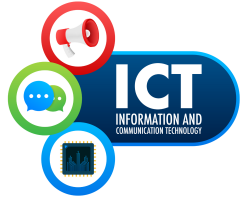ICT
Subject Lead for ICT
Mr Rose

The ICT subject staff aim to deliver the highest quality of education to all our learners through effective and engaging teaching and learning. This subject is very popular among students in the school who engage well in lessons taught by dedicated, well qualified and experienced teaching and support staff. While at KS3 our leaners acquire a wide range of skills, which prepares them for their subject choices at KS4, our qualifications at both KS4 and 5 are carefully chosen to ensure that students have the best opportunities to access a variety of career options with employers or at a higher institution of learning.
Year 7 ICT
Unit 1. Using computers safely, effectively and responsibly
In this unit students learn how to use computers safely, effectively and responsibly. Pupils begin by looking at file management and security. There are a wide range of e-safety issues that are also covered including cyber-bullying and phishing as well as other potential online threats. Students are also taught to understand and be aware of potential issues with online communication such as social media and email including online profiles and online data security.
Unit 2. Understanding Computers
Pupils will revise some of the theory on input and output covered in previous learning and continue to look at the Input-Process-Output sequence and the Fetch-Decode-Execute cycle through practical activities. Pupils will then look at some simple binary to decimal conversion and vice versa and learn how text characters are represented using the ASCII code. This will be followed by some simple binary addition. Pupils will learn more in depth how storage devices represent data using binary patterns and physically save these patterns. Finally, they will look at a brief history of communication devices, how new technologies and applications are emerging and the pace of change.
Unit 3. Multimedia project on Computer Hardware
Students use their knowledge of understanding computers to create a digital artifact for a given target audience. They will understand how to ensure their work suits its purpose and what sort of techniques can be used to target different demographics. This includes considering the use of text and images, as well as looking at how other types of media can be used alongside them.
Unit 4. Computational Thinking
This unit introduces students to the world of computational thinking and logic. With the help of many activities, students get to understand the power of problem solving and the different methods that Computer Scientists use to tackle problems. This forms the underpinning of the programming they do in later units throughout their IT learning journey.
Unit 5. Games Programming in Scratch
In this unit pupils will be introduced to the Scratch programming environment and begin by reverse-engineering some existing games. They will then progress to planning and developing their own games, learning to incorporate variables, procedures (using the Broadcast function), lists and operators. They should be able to create a fully working game with lives, scoring and some randomisation of objects. Finally, they will learn to test and debug their programs.
Year 8 ICT
Unit 1. Computer Crime and cyber security
This unit covers some of the legal safeguards regarding computer use, including overviews of the Computer Misuse Act, Data Protection Act and GDPR and Copyright Law and their implications for computer use. Phishing scams and other email frauds, hacking, “data harvesting” identity theft and safe use of social media are discussed together with ways of protecting online identity and privacy. Health and Safety Law and environmental issues such as the safe disposal of old computers are also discussed.
Unit 2. Graphics
This is an introduction to graphics and graphic file types. The unit explores how bitmap and vector images are represented and stored by the computer. There is also opportunity for pupils to practise skills in design, photo-editing and image manipulation using a suitable graphics package. The pupils’ final posters are put into an assessment portfolio.
Unit 3. Spreadsheet modelling
In this unit students will learn how to work with Microsoft Excel to handle data. They will look at various financial uses of spreadsheets and explore how they can use different formulae and functions to determine the impact of different values.
Unit 4. Small Basic programming
Students build on their logical thinking and programming skills developed in year 7. They move from block-based programming to textual programming, developing their knowledge of key concepts such as iteration and selection. They learn the structure and commands of the language to apply programming concepts to artistic creations.
Unit 5. HTML and website development
In this unit students learn about how web pages are styled and created using HTML and CSS. They will study HTML that sets out the structure of web pages and CSS that determines the style of different elements on the page. They look at how these techniques can be used to design a basic web site and include information and images that are accessible to a range of different users.
Year 9 ICT
Unit 1. Modern technologies
This unit progresses from some of the learning students covered in year 7 and 8 by looking at how technology can be used to enhance communication, the sharing and distribution of files alongside the importance of cloud services and storage. In addition, students learn about how computers can create a more inclusive workplace environment for a range of different needs.
Unit 2 Databases
This is a practical unit covering the basic theory, creation and use of a single-table database and a simple relational database involving two tables in a one-to-many relationship. Microsoft Access is used in this unit. Pupils will start by looking at an existing single-table database, learning how to add records and make queries. In subsequent lessons they will create
- a flat-file or two-table relational database of their own, using suitable field types and adding in appropriate validations
- an input form with help text, combo boxes and list boxes
- queries and a report using data from one or both tables
- a front-end menu for their application linking to the database input form and report
Unit 3. Impacts of Digital Technology
Students will learn about the impact of digital technology on the wider world. Elements of cyber security are revisited whilst they will also understand how technology affects, and is affected by, ethics and legislation. Lastly, students will investigate the rising environmental impact of technology, understanding the problems caused by e-waste.
Unit 4. Introduction to Python
Students will be introduced to the basic concepts in programming. They will use a language called Python to complete various tasks to build their skills and knowledge of programming as a step up from the learning they completed in their year 7 Scratch project.
Unit 5. Animation
In this unit pupils will learn basic graphic drawing and animation techniques such as frame-by-frame animation and tweening, working with layers and adding simple interactivity and ActionScript. They will undertake a creative project to plan, create and evaluate a short animation of their own, as well as studying professionally made animations.
At KS4 Learners follow the 2-year BTEC Digital Information Technology Tech Award which give learners the opportunity to develop sector-specific knowledge and skills in a practical learning environment, including:
- Development of key skills that prove their aptitude in digital information technology, such as project planning, designing and creating user interfaces, creating dashboards to present and interpret data.
- Processes that underpin effective ways of working, such as project planning, the iterative design process, cyber security, virtual teams, legal and ethical codes of conduct.
- knowledge that underpins effective use of skills, process and attitudes in the sector, such as how different user interfaces meet user needs, how organisations collect and use data to make decisions, virtual workplaces, cyber security and legal and ethical issues.
With a third of businesses in the UK experiencing a cyber breach or attack, this a growing area of specialism within the UK. Skills such as data analysis are in high demand, well paid and have high projected growth in the next 5 years locally and nationally. Therefore, students studying this course will be developing skills that will that are sought after and of immense benefit to industry.
Assessment:
The BTEC Tech Awards in Digital Information Technology and Enterprise qualifications are formally assessed through controlled assessment and examination which is externally assessed. The two controlled assessment tasks make up 60% of the final grade, with single exam making up the final 40%.
For GCSE in Computer Science students are assessed through two external examinations at the end of Year 11, each exam is worth 50%. For all courses learners engage in both formative and summative assessments as part of the learning and teaching process in and outside the classroom.



